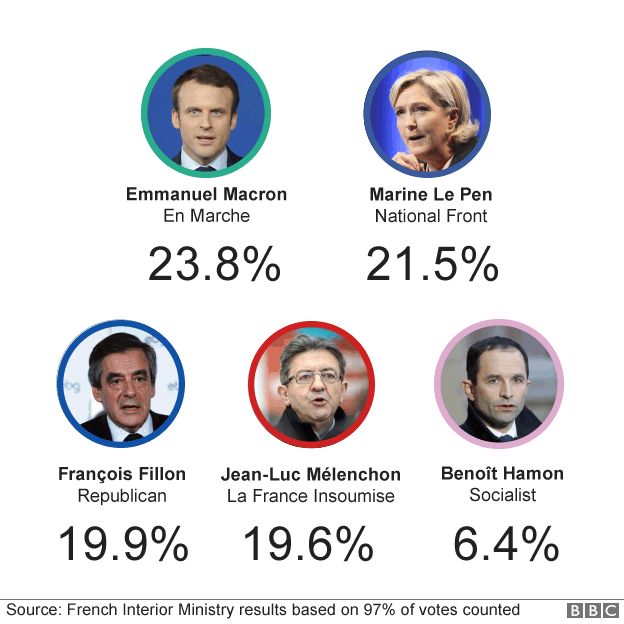
Paris - Centrist Emmanuel Macron has gone through to the second round of the French election, where he will face far-right leader Marine Le Pen. Mr Macron, a former banker, is seen as a political newcomer - and ran without the backing of an established party. After topping Sunday's vote, he is now favourite to win the run-off on 7 May. It is the first time in six decades that neither of France's main left-wing or right-wing parties has had a candidate in the second round.
Mr Macron won 23.8% of votes in the first round, while Ms Le Pen took 21.5%. The turnout was high, at almost 79%. The nearest challengers, centre-right François Fillon and hard-left Jean-Luc Mélenchon, fell behind with just over 19% each. But several political rivals are now expected to unite behind Mr Macron in the run-off vote, in a bid to keep Ms Le Pen's Front National (FN) from power. At 39, Mr Macron could become the youngest president France has ever had - and the first president in the Fifth Republic who does not belong to a major party. Mr Macron was current President Francois Hollande's economy minister but quit to create his own party, En Marche, which pushes a liberal, pro-EU agenda. In a victory speech to supporters, Mr Macron borrowed language favoured by his rival to describe himself as the patriotic choice for France. "I hope that in a fortnight I will become your president. I want to become the president of all the people of France - the president of the patriots in the face of the threat from the nationalists," he said. Correspondents say the next head of state is almost certain to be Mr Macron, as most other parties are now backing him. Benoît Hamon, the candidate of President Hollande's Socialist Party who failed to make an impact in the first round, urged those who voted for him to support Mr Macron in the next stage. Mr Fillon has done the same. However, Mr Mélenchon has not endorsed either candidate yet. Mr Macron may struggle to secure a majority in the national assembly, as he does not have the backing of an established political party.
This means he would have to negotiate to have his policies approved through parliament - which could be challenging.(FA)


